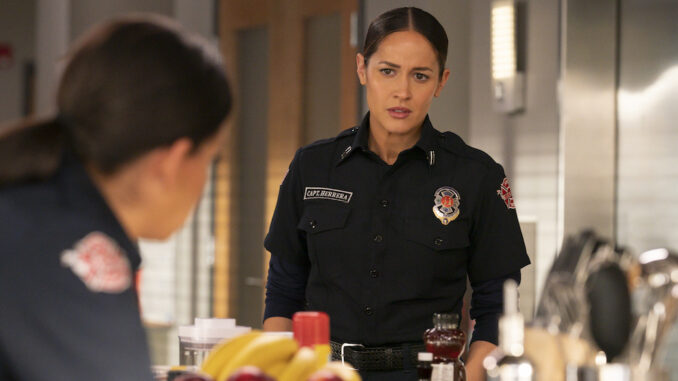
The bell rung, not for a dispatch, but for a century of stories. One hundred episodes – a rare, gleaming milestone in the fickle landscape of television. For the cast and producers of Station 19, this benchmark should have been a purely triumphant moment, a testament to years of dedication, searing narratives, and a loyal fanbase. Yet, as they gathered to reflect, a shadow, cool and unexpected, fell across the warm glow of their achievement: the news of the show’s impending, unforeseen cancellation. It transformed a celebration into a profoundly bittersweet farewell, a poignant reflection on a journey abruptly cut short.
To reach 100 episodes is to forge a family, both on and off-screen. The Seattle Fire Department’s Station 19, the gritty heart of the series, had become more than a set; it was a home. The cast, having shared countless hours in simulated infernos, navigating emotional wreckage, and delivering lines that spoke to the deepest parts of the human condition, spoke of a bond forged in the heat of creation. As they looked back, their reflections were steeped in an obvious pride. They recalled the grueling physicality of their roles, the emotional toll of portraying first responders, and the profound responsibility of bringing these heroes to life. One hundred episodes meant a shared history, an intricate web of personal and professional growth woven over seven seasons. It was a testament to resilience, much like the firefighters they portrayed, who consistently faced peril and emerged, often scarred, but always united.
What truly distinguished Station 19 and made its milestone feel particularly significant was its unflinching commitment to diverse stories. From its inception, the show carved out a space where the melting pot of American society was not just acknowledged but deeply explored. It wasn't content with tokenism; it delved into the nuanced lives of its characters, exploring racial identity, LGBTQ+ experiences, mental health struggles, and socio-economic disparities with an authenticity that resonated profoundly. The firehouse became a microcosm of the world outside, reflecting the beauty and complexity of human relationships across various backgrounds. Viewers saw themselves represented not as stereotypes, but as multi-dimensional individuals grappling with universal themes through unique lenses. The producers, in their reflections, spoke of this intentionality—a conscious effort to push boundaries, spark conversations, and use the powerful platform of network television to advocate for empathy and understanding. They crafted narratives that weren't just about saving lives from fire but about saving souls from prejudice and misunderstanding.
This commitment to diverse, impactful storytelling made the news of its unexpected cancellation all the more jarring. It felt like a fire put out too soon, a siren silenced before its mission was complete. The initial jubilation of 100 episodes was swiftly undercut by a sense of loss, a collective gasp from the cast, crew, and particularly the dedicated fanbase. How could a show that consistently delivered strong ratings, tackled vital social issues, and fostered such a loyal community be deemed expendable? The reflection on this abrupt end was tinged with confusion and a quiet sorrow. The actors, who had poured their hearts into characters that truly mattered, now faced the reality of saying goodbye. Producers, who had meticulously crafted an arc of growth and change for their beloved Seattle firefighters, suddenly had to condense years of planned storytelling into a finite number of concluding episodes. It was an undeniable blow, a stark reminder of the often-unpredictable forces that govern the entertainment industry, where artistic merit and social impact can sometimes take a backseat to corporate decisions.
Yet, even in the shadow of cancellation, the reflection was ultimately one of immense gratitude and enduring pride. The cast and producers, though saddened, held onto the understanding that their work had profoundly impacted countless lives. They created a legacy of representation, a beacon of authenticity that will long outlive its broadcast run. Station 19 proved that heroism comes in many forms, in many skin tones, and in many sexual orientations. It showed that strength lies in vulnerability, and that community is forged not by sameness, but by shared purpose and unwavering support.
As the final episodes air, the 100-episode milestone serves as a poignant reminder of what was achieved, rather than what could have been. The reflections of the cast and producers are a testament to a show that burned brightly, illuminated diverse paths, and left an indelible mark. Though the station may close its doors on air, the stories it told, the conversations it ignited, and the family it created will continue to echo, a permanent part of television history, an unexpected cancellation unable to diminish the powerful blaze it once kindled.
